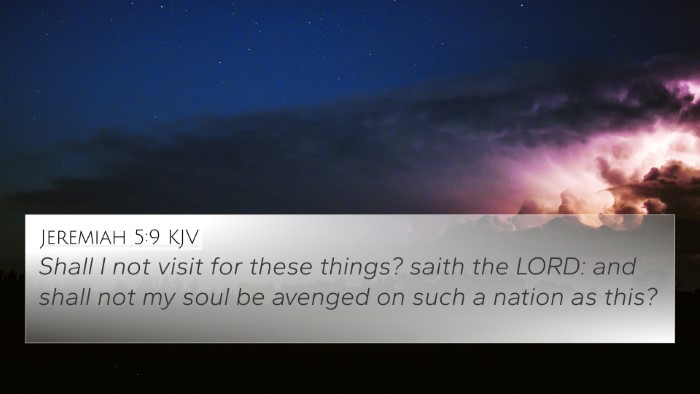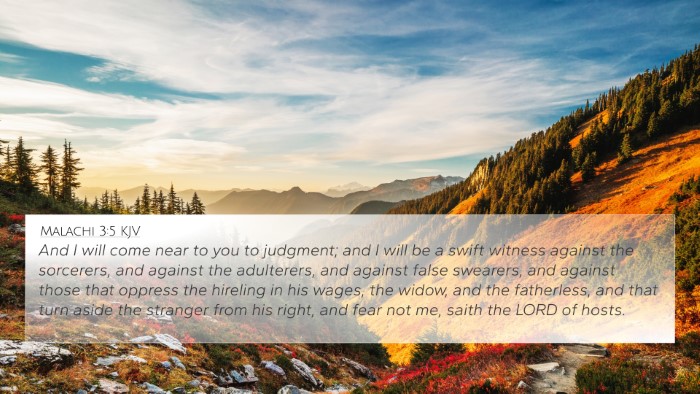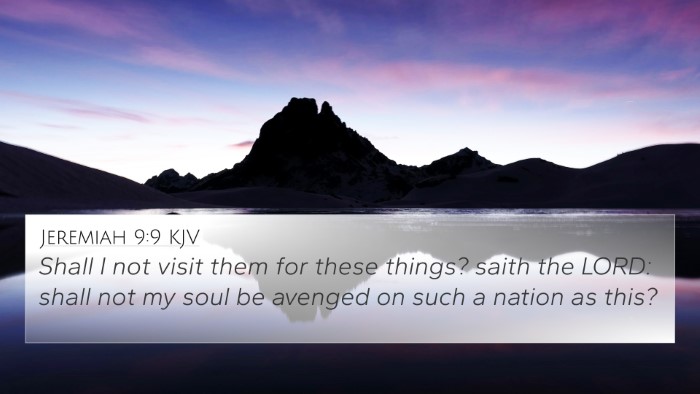Understanding Jeremiah 5:29
Verse Reference: Jeremiah 5:29 - "Shall I not visit for these things? saith the Lord: shall not my soul be avenged on such a nation as this?"
Overview of the Verse
This verse reflects God's righteous anger towards Israel amid their sinful behavior. It raises critical questions about divine justice and accountability, emphasizing God's intention to bring judgement upon nations that forsake His law.
Exegesis and Commentaries
Matthew Henry: Henry emphasizes the seriousness of God's inquiry regarding the sins of Israel. It underscores the concept that divine judgement is inevitable in response to persistent disobedience. God, as the supreme judge, must address the consequences of the nation's actions; this asserts the truth that sin always invites divine scrutiny.
Albert Barnes: Barnes highlights the rhetorical question posed by God, which serves to remind the people of their obligations. He explains that the phrase "shall I not visit" reflects God's promise to execute justice. The key theme here is accountability — God will act against the immorality present in society. This verse serves as a sobering reminder that the Creator does not overlook the transgressions of His people.
Adam Clarke: Clarke focuses on the relational aspect of God's judgement, depicting it as a personal and deep concern. He notes how God's soul is affected by the nation's sins, illustrating the emotional weight of divine justice. The emphasis on the uniqueness of Israel’s covenant relationship with God enhances the understanding of why sin against Him incurs such severe consequences.
Thematic Connections
Jeremiah 5:29 connects with various themes found throughout Scripture regarding judgement, accountability, and God's nature. Here, we explore some relevant Bible verse cross-references that deepen the understanding of this verse:
- Deuteronomy 32:35: “To me belongeth vengeance, and recompense; their foot shall slide in due time.” - This passage parallels the theme of God's judgment as recompense for sin.
- Isaiah 59:1-2: “Behold, the Lord's hand is not shortened, that it cannot save; neither his ear heavy, that it cannot hear: But your iniquities have separated between you and your God.” - Emphasizes how sin creates a barrier between God and man.
- Ezekiel 18:30: “Therefore I will judge you, O house of Israel, every one according to his ways, saith the Lord God. Repent, and turn yourselves from all your offenses...” - Highlights individual accountability before God.
- Romans 1:18: “For the wrath of God is revealed from heaven against all ungodliness and unrighteousness of men...” - A New Testament confirmation of divine wrath against sinful behavior.
- Galatians 6:7: “Be not deceived; God is not mocked: for whatsoever a man soweth, that shall he also reap.” - The principle of reaping what one sows ties directly back to Jeremiah’s assertion of God’s vengeance.
- 2 Corinthians 5:10: “For we must all appear before the judgment seat of Christ; that every one may receive the things done in his body...” - Reinforces the idea of accountability in God's judgment.
- Revelation 20:12: “And I saw the dead, small and great, stand before God; and the books were opened...” - Depicts the final judgment aligning with God's concern for righteousness.
- Hebrews 10:31: “It is a fearful thing to fall into the hands of the living God.” - Emphasizes the seriousness of being subject to God’s judgment.
- Amos 3:2: “You only have I known of all the families of the earth: therefore I will punish you for all your iniquities.” - This speaks to the special relationship and consequent responsibility between God and His chosen people.
- Psalm 9:16: “The Lord is known by the judgment which he executeth: the wicked is snared in the work of his own hands.” - God's judgments reveal His nature and serve justice to the wicked.
Applying the Message Today
The message of Jeremiah 5:29 resonates with contemporary readers who seek to understand divine justice. It encourages introspection regarding personal and communal behaviors that may hinder one's relationship with God. As we contemplate the connections between Bible verses surrounding themes of accountability and judgement, we are reminded of the importance of maintaining a righteous path.
Tools for Bible Cross-Referencing
For those engaging deeper with Scripture, utilizing Bible reference resources such as concordances and cross-reference guides can enhance understanding of interconnected Biblical texts. Here are some effective ways to cross-reference Biblical texts:
- Using a Bible Concordance: A concordance provides a comprehensive list of words and themes in the Bible along with their locations, helping to identify related Scriptures.
- Cross-reference Bible Study: This method involves systematically looking up passages that relate to one another, revealing themes and principles that span across the Bible.
- Online Bible Study Tools: Many websites and apps offer features to search and link Bible verses based on themes, keywords, and topics for easy analysis.
- Bible Study Groups: Engaging with a community allows for shared insights into Scriptures and encourages extensive discussion about thematic connections.
- Personal Reflection: Take time to meditate on a specific verse and jot down any related verses that come to mind. This practice strengthens personal understanding.
Conclusion
The powerful lessons from Jeremiah 5:29 remind believers that God’s concern for holiness compels Him to address sin with righteous judgment. Through careful study and comparative Bible verse analysis, seekers of truth can explore the depths of divine wisdom and apply these ancient lessons to modern life.
Staying attuned to Bible verses that relate to each other enriches one's spiritual journey and cultivates a deeper understanding of God's character and His expectations from His people.






